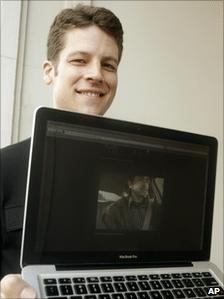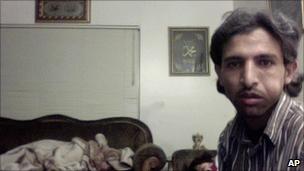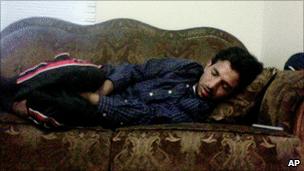Joshua Kaufman's Mac recovered with 'Hidden' app clues
- Published

Mr Kaufman said police apologised for mishandling his case
California police recovered a stolen laptop after a software program sent its owner the suspect's location and photograph taken on the Mac's camera.
Joshua Kaufman, an Oakland interaction designer, reported the theft in March.
But police only acted on Tuesday after Mr Kaufman's blog on the theft attracted news media attention.
Cab driver Muthanna Aldebashi, 27, was charged with felony possession of stolen property. A police spokesman said an initial reported was misfiled.
"I'm excited I was able to get it back," Mr Kaufman told the BBC, "very happy and relieved that I don't have to sit and watch someone else use my old computer."
On 21 March, during the day when Mr Kaufman was not at home in his Oakland flat, a thief broke into the apartment through a window.
'Hidden' software
Mr Kaufman immediately reported the crime to Oakland police and the officer who took the report noted he said he had tracking software installed, Officer Holly Joshi told the BBC.
The software, called Hidden, external, supplies to the owner the computer's location, photographs taken on the Mac's internal camera and shots of the Mac's screen display.

Mr Aldebashi was identified after Mr Kaufman provided photos like this one to Oakland police
The program immediately began sending Mr Kaufman photographs of a bearded man with shaggy dark hair sleeping on a couch, sitting shirtless on a bed in front of the computer, and driving.
"It wasn't really that interesting," he said. "Most of the photos were pretty boring - just some guy staring into a screen or sleeping or watching Youtube videos on his bed."
The software also sent Mr Kaufman a screen shot showing the man logging into his own e-mail account - information investigators later used to lure him into an arrest.
Mr Kaufman says he handed the evidence to Oakland investigators but did not get a response. Meanwhile, he began blogging about the theft on a site called thisguyhasmymacbook, external.
Marketing campaign rumour
His experience - and Oakland police's apparent lack of interest in the case, even though Mr Kaufman said he could provide clues - soon attracted attention from the US news media.

The software offered an intimate glimpse into the suspect's doings
"People started saying it was a viral campaign from us," Hidden chief Toby De Havilland told the BBC.
On Tuesday, a producer with ABC television's Good Morning America news and entertainment programme contacted Officer Joshi to inquire about the case.
Ms Joshi contacted investigators and learned Mr Kaufman's initial report had been filed in error with theft reports for which no leads existed to aid the investigation.
About three hours after ABC's call, Oakland police arrested Mr Aldebashi, who made "admission statements" indicating he knew the laptop was stolen, Ms Joshi said.
Police have not charged Mr Aldebashi with the initial burglary, and Mr Kaufman said he believes Mr Aldebashi bought the stolen laptop on the street.
"Law enforcement is always looking at technology as a way to be smarter with capturing criminals and solving crimes," Officer Joshi told the BBC.
"And this does represent technology that could be useful for us."
Suspect lured
Mr Kaufman wrote on his blog that investigators used information he provided - an e-mail address linked to a car service for which Mr Aldebashi was a driver - to lure the suspect into an arrest by pretending to hire a cab.
Meanwhile, Mr De Havilland said the notoriety has driven interest in his product.
"We've definitely noticed a spike," he said.